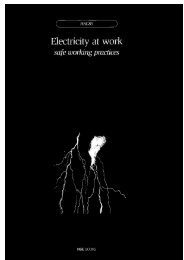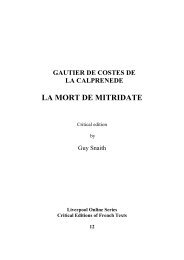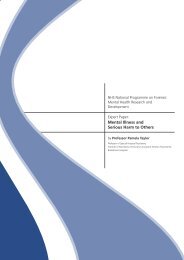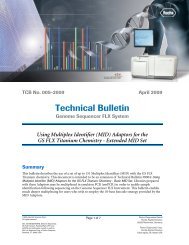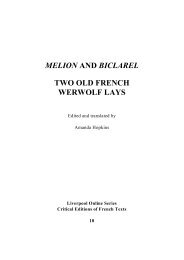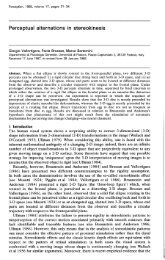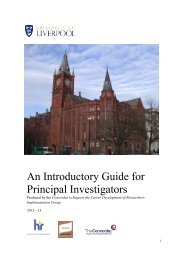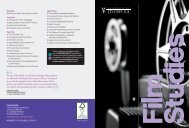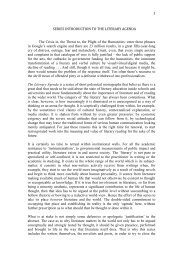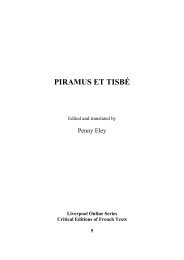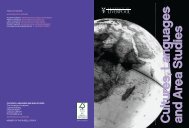LA MORT DE MITRIDATE - University of Liverpool
LA MORT DE MITRIDATE - University of Liverpool
LA MORT DE MITRIDATE - University of Liverpool
You also want an ePaper? Increase the reach of your titles
YUMPU automatically turns print PDFs into web optimized ePapers that Google loves.
La Mort de Mitridate<br />
scene Pompée, speaking to Pharnace, evokes the years <strong>of</strong> war and refers to<br />
Mitridate’s cruelty; from his first scene, Mitridate, surrounded by his family,<br />
refers to his past tussles with Pompée (I.2) and later provides further impressions<br />
<strong>of</strong> the past (IV.3). There is no need to distinguish between First, Second or Third<br />
Mithradatic Wars; it is sufficient to create an atmosphere <strong>of</strong> years, indeed decades,<br />
<strong>of</strong> war between Rome and Pontus in order to justify the war-weariness <strong>of</strong><br />
someone like Pharnace. Detail can be multi-functional. As well as providing<br />
characters with a pre-dramatic past, references to past battles on land and at sea<br />
contrast with the present sequestered state <strong>of</strong> Mitridate and his family and their<br />
ever-diminishing room for manœuvre over the course <strong>of</strong> the play. ‘Flacce, Cotta,<br />
Fimbrie, & Triaire, vaincus’ (IV.3.1203), Mitridate throws at Pharnace as pro<strong>of</strong> <strong>of</strong><br />
what he has been capable <strong>of</strong> in the past. And a few lines later he is countering his<br />
son’s argument with other names: ‘Tu peux encore mieux confirmer ta pensée, /<br />
En m’alléguant Siphax, ou Jugurte, ou Persée.’ (IV.3.1214). It would not be<br />
vraisemblable to have any explanation <strong>of</strong> who these names refer to because<br />
Pharnace, who has fought beside his father for years, knows exactly who they are.<br />
But the texture <strong>of</strong> the play is made denser, the contours <strong>of</strong> this world richer, by the<br />
use <strong>of</strong> such strings <strong>of</strong> proper names, all <strong>of</strong> which La Calprenède will have readily<br />
found in Appian, Plutarch or Florus. 55 It does not matter if the audience does not<br />
know who each individual figure is or what role they played in Mithradates’ life,<br />
for the aesthetic value <strong>of</strong> such names rises above the mere factual. Strung together<br />
as enumerations, they also <strong>of</strong>fer the aural pleasure <strong>of</strong> euphony.<br />
In 1907, comparing La Calprenède and Racine, Médan felt that La Mort de<br />
Mitridate had been marred by its author’s ‘souci de faire œuvre d’historien’. 56 A<br />
century later, Charles Mazouer can still write: ‘Comme dans ses romans, La<br />
Calprenède se veut historien dans ses tragédies’. 57 As pro<strong>of</strong>, Médan cited the Au<br />
Lecteur as showing ‘le plus grand respect pour la vérité historique’ (p. 48), but, as<br />
Forestier has pointed out: ‘On n’invoque la vérité historique que pour expliquer<br />
que l’on avait les meilleures raisons de prendre des libertés avec elle’. 58 More<br />
interesting than such conventional protestations on La Calprenède’s part is rather<br />
the freedom that he demonstrates in his attitude to the historical sources.<br />
55<br />
In Mithridate Racine will tend to use place names, giving a geographical<br />
expansiveness to the play.<br />
56<br />
Pierre Médan, ‘Un Gascon précurseur de Racine: La Mort de Mithridate de La<br />
Calprenède et le Mithridate de Racine’, Revue des Pyrénées, 19 (1907), 44-63 (p. 58).<br />
Twenty-five years earlier Bernardin, in his edition <strong>of</strong> Mithridate, also commented that<br />
the earlier play was ‘bien plus fidèle à l’histoire que celle de Racine’ (p. 6).<br />
57 e<br />
Le Théâtre français de l’âge classique, I: Le Premier XVII siècle (Paris: Champion,<br />
2006), p. 366.<br />
58<br />
‘Théorie et pratique de l’histoire dans la tragédie classique’, Littératures classiques,<br />
11 (1989), 95-107 (p. 101). In his edition <strong>of</strong> Mairet’s Marc-Antoine, for example,<br />
Alain Riffaud quotes from La Calprenède’s Au Lecteur in order to prove his point that<br />
‘la liberté que Mairet prend avec l’Histoire était partagée par la majorité de ses<br />
contemporains’, in Théâtre complet, I (Paris: Champion, 2004), p. 223.<br />
18



